英语(下册)课后练习答案
- 格式:doc
- 大小:412.50 KB
- 文档页数:48
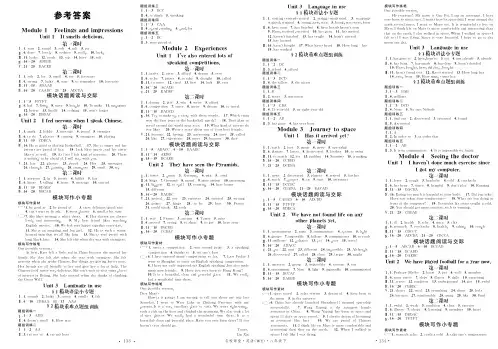
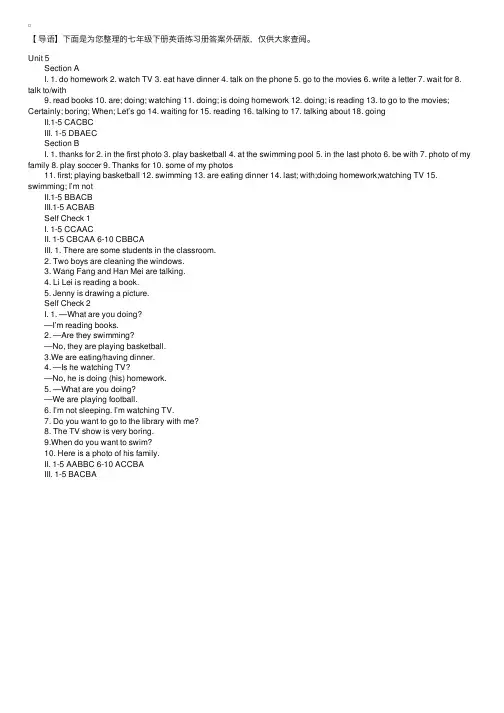
【导语】下⾯是为您整理的七年级下册英语练习册答案外研版,仅供⼤家查阅。
Unit 5 Section A I. 1. do homework 2. watch TV 3. eat have dinner 4. talk on the phone 5. go to the movies 6. write a letter 7. wait for 8. talk to/with 9. read books 10. are; doing; watching 11. doing; is doing homework 12. doing; is reading 13. to go to the movies; Certainly; boring; When; Let’s go 14. waiting for 15. reading 16. talking to 17. talking about 18. going II.1-5 CACBC III. 1-5 DBAEC Section B I. 1. thanks for 2. in the first photo 3. play basketball 4. at the swimming pool 5. in the last photo 6. be with 7. photo of my family 8. play soccer 9. Thanks for 10. some of my photos 11. first; playing basketball 12. swimming 13. are eating dinner 14. last; with;doing homework;watching TV 15. swimming; I’m not II.1-5 BBACB III.1-5 ACBAB Self Check 1 I. 1-5 CCAAC II. 1-5 CBCAA 6-10 CBBCA III. 1. There are some students in the classroom. 2. Two boys are cleaning the windows. 3. Wang Fang and Han Mei are talking. 4. Li Lei is reading a book. 5. Jenny is drawing a picture. Self Check 2 I. 1. —What are you doing? —I’m reading books. 2. —Are they swimming? —No, they are playing basketball. 3.We are eating/having dinner. 4. —Is he watching TV? —No, he is doing (his) homework. 5. —What are you doing? —We are playing football. 6. I’m not sleeping. I’m watching TV. 7. Do you want to go to the library with me? 8. The TV show is very boring. 9.When do you want to swim? 10. Here is a photo of his family. II. 1-5 AABBC 6-10 ACCBA III. 1-5 BACBA。
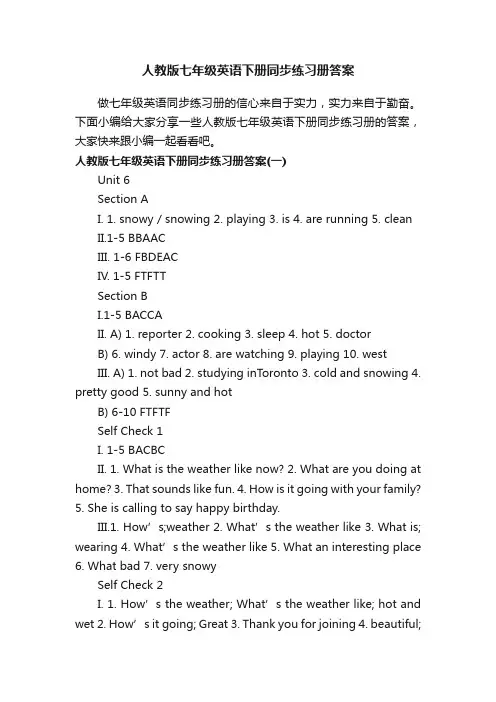
人教版七年级英语下册同步练习册答案做七年级英语同步练习册的信心来自于实力,实力来自于勤奋。
下面小编给大家分享一些人教版七年级英语下册同步练习册的答案,大家快来跟小编一起看看吧。
人教版七年级英语下册同步练习册答案(一)Unit 6Section AI. 1. snowy / snowing 2. playing 3. is 4. are running 5. cleanII.1-5 BBAACIII. 1-6 FBDEACIV. 1-5 FTFTTSection BI.1-5 BACCAII. A) 1. reporter 2. cooking 3. sleep 4. hot 5. doctorB) 6. windy 7. actor 8. are watching 9. playing 10. westIII. A) 1. not bad 2. studying inToronto 3. cold and snowing 4. pretty good 5. sunny and hotB) 6-10 FTFTFSelf Check 1I. 1-5 BACBCII. 1. What is the weather like now? 2. What are you doing at home? 3. That sounds like fun. 4. How is it going with your family?5. She is calling to say happy birthday.III.1. How’s;weather 2. What’s the weather like 3. What is; wearing 4. What’s the weather like 5. What an interesting place 6. What bad 7. very snowySelf Check 2I. 1. How’s the weather; What’s the weather like; hot and wet 2. How’s it going; Great 3. Thank you for joining 4. be autiful;sunny 5. many people; on vacation 6. Some; taking photos; others are lying 7. Look at; group 8. surprised 9. a veryinteresting place 10. really very relaxed 11. It’s winter 12. having a good time 13. drinking 14. when it’s raining II. 1-5 CBABC 6-10 CAACB人教版七年级英语下册同步练习册答案(二)Unit 7Section AI.1. curly 2. nothing 3. brown / blonde 4. pop 5. nobodyII. 1-5 BBACCIII. 1. look like 2. short hair 3. long hair 4. curly hair 5. straight hair 6. medium height 7. medium build 8. short straight hair 9. very popular 10. a little bit quiet 11. does; look like; of medium build; has 12. know; don’t think I know 13. always wears 14. captain 15. popular 16. good-looking; a little bit quiet 17. to tell jokes 18. a little bit heavy 19. never stops talking 20. reading; playing chessIV. 1-5 BEDCASection BI. 1. build 2. captain 3. Remember 4. always 5. jokeII. 1-5 ACBAAIII. 1. a tall man with glasses 2. Some people; new looks 3. I don’t think he’s so great; does 4. go shopping; nobody knows me 5. tell jokes 6. love 7. long black hair 8. stop 9. like 10. pop singer 11. with glasses 12. a new lookSelf Check 1I.1. with a beard; curly hair 2. her new look 3. looks like 4. stops working 5.popular;ofII. 1. doesn’t do 2. Does; have 3. Who does; look 4. mediumheight 5. inIII. 1-5 BCBCA 6-10 BACBAIV. 1. round 2. light brown and short 3. thin 4. long curly 5. big blueSelf Check 2I. 1. know 2. look 3. medium 4. bit 5. curly 6. glasses 7. good-looking 8. jokes 9. popular 10. rememberII. A) 1-5 CBCABB)1. Susan. 2. Because she has an important meeting. 3. William. 4. Tall. 5. Yes, she does.人教版七年级英语下册同步练习册答案(三)Unit 8Section AI. 1. large 2. drink 3. onions 4. seasons 5. dumplingsII. 1-5 AABCBIII. 1. some; a 2. some; a 3. an 4. some 5. an; someIV. 1. what kind of 2. beef and tomato noodles 3. a large bowl of noodles 4. What kind of; would; like 5. would he;like small/medium/largeV. 1. Can 2. help 3. some 4. noodles 5. do 6. have 7. do 8. have 9. large 10. medium 11. small 12. mediumSection BI. 1. tomatoes 2. to play 3. sunny 4. onion 5. eatingII. 1-5 CACCAIII. 1-5 CEBDASelf Check 1I. 1. orange juice 2. green tea 3. house; dumplings 4. and 5. or 6. some great specials 7. has; for 8. Come; eat 9. small; medium; or large 10. some soupII. 1-5 BACCASelf Check 2I.1. What kind of books 2. would like 3. large bowl 4. cups of5. for breakfastII. 1. help 2. noodles 3. kind 4. and 5. size 6. have7. medium 8. HereIII. 1-5 FFTFT。
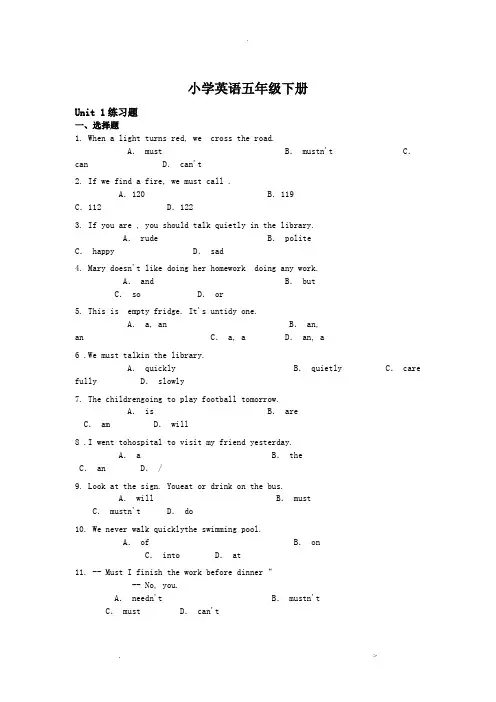
小学英语五年级下册Unit 1练习题一、选择题1. When a light turns red, we cross the road.A. must B. mustn't C.can D. can't2. If we find a fire, we must call.A.120B.119C.112 D.1223.If you are, you should talk quietly in the library.A. rude B. politeC. happy D. sad4. Mary doesn't like doing her homework doing any work.A. and B. butC. so D. or5. This is empty fridge. It's untidy one.A. a, an B. an,an C. a, a D. an, a6 .We must talkin the library.A. quickly B. quietly C. care fully D. slowly7. The childrengoing to play football tomorrow.A. is B. areC. am D. will8 .I went tohospital to visit my friend yesterday.A. a B. theC. an D. /9. Look at the sign. Youeat or drink on the bus.A. will B. mustC. mustn't D. do10. We never walk quicklythe swimming pool.A. of B. onC. into D. at11. -- Must I finish the work before dinner“-- No, you.A. needn't B. mustn'tC. must D. can't12. Weplay at the museum.A. mustn't B. needn'tC. must D. will二、阅读理解〔一〕It is Sunday. Jim doesn't go to school. He and his friends are playing in front of a house. A young man es and asks, "Hello, Jim. Is your father at home“" "Yes, he is," Jim answers.The man knocks at the door. He knocks it for a long time, but no one es to open the door. He says to Jim angrily, "You say your father is at home. Why doesn't he open the door“" Jim answers, "Yes, he is at home. But this is not my home, sir!" 根据短文,判断正(T)误(F):1. Today is Saturday.2. Jim and his friends are going to school.3. They are playing.4. That man didn't know Jim.5. Jim's father isn't at home.〔二〕Tony is a good driver. He is twenty-three years old. He drives a truck on a farm. He works from Monday to Friday. His home is far away from the farm. He gets up at a quarter past five. He goes to work at ten to si* o'clock. At five past seven he must get there. He has no time to have breakfast at home. He leaves the farm at five o'clock. He cooks supper and does housework in the evening.He likes reading a lot. Sometimes he watches TV. He goes to bed at about ten.1.Tony.A.is a worker B.is a truck driverC.teaches on a farm D.makes trucks2.On Saturday and Sunday Tony.A.doesn't go to work B.stays at homeC.goes to the farm D.reads books3., so he has no time to have breakfast.A.He is busy B.His farm is too farC.He doesn't like having breakfast D.He often gets up early 4.He has lunch.A.at home B.in his truckC.on the farm D.in the park5.Hein the evening.A.washes his clothes B.cooks supperC.does housework D.Both B and C〔三〕Bus rulesMolly is a little mouse. She lives with other animals at Animal Land. Everymorning she goes to school by bus with other baby animals. There are a lot of rules for taking the school bus. Here are some of them.You mustn't eat or drink on the bus. You mustn't stretch you head or arms out of the windows. You mustn't talk loudly on the bus. You must sit quietly on the bus. You mustn't play games with others. You mustn't leave the seats or stand up. You mustn't fight.Not every body likes the rules. But rules are rules. Every one has to follow. Molly is a good girl. She always follows the rules.在正确的句子前面写"T〞,错误的句子前面写"F〞.1.You mustn't eat or drink on the school bus.2. You can stand up or leave the seats on the bus.3. You can talk loudly on the bus.4. You mustn't play games on the bus.5. You can stretch your head or arms out of the windows on the bus.6. Molly doesn't follow all the rules.Unit 2 Helping people 练习题一、选择题1. What happenedyou“A. for B. ofC. to D. at2. Li Dongsome fruit yesterday.A. buy B. bought C. buysD. is buying3.I found an umbrella and gave itthe teacher.A. for B. of C. toD. at4.--WhatBettylast week“-- She made a cake.A.did; make B.does; makeC.did; makes D.does; makes5. Mr. Lee had a lot of money but henot happy.A. is B. are C. w as D. were6.-- Did Sueswimming on Sunday“--No, she didn't.A. went B. goes C. goingD. go7. What timeyou usually get up on Saturday“A. do B. did C. doesD. are8. I wantpeople.A. help B. helps C. to help D. helping9.go to the park tomorrow.A. Let's B. We C.Let D. Let's us10 .He was not old but he can't.A. saw B. see C. to see D. Seeing二、阅读理解〔一〕Li Mei's uncle lives in Beijing. Li Mei went there with her parents last National Holidays. They went there by train. It was a long trip.The ne*t morning they arrived at Beijing. Her uncle went to the train station to meet them.Li Mei played happily and ate a lot of good food. They visited the Great wall,the Summer Palace and many other interesting places and took lots of pictures.They hada good time.1. Who lives in Beijing“A. Li Mei. B. Li Mei's uncle. C. Li Mei's parents.2. How did they go to Beijing“A. By bus.B. Bytrain. C. By plane3. Did Li Mei's family visit the Summer Palace“A. Yes, they did. B. Yes, theywere.C. No, they didn't4. Was the trip long“A. No, it wasn't. B. Yes, itwas. C. Yes, there was.5. Did Li Mei and her parents play happily in Beijing“A. Yes,they did. B. No, theydidn't C. Yes, they were.〔二〕阅读猴子和鳄鱼的小短文,然后答复以下问题吧。
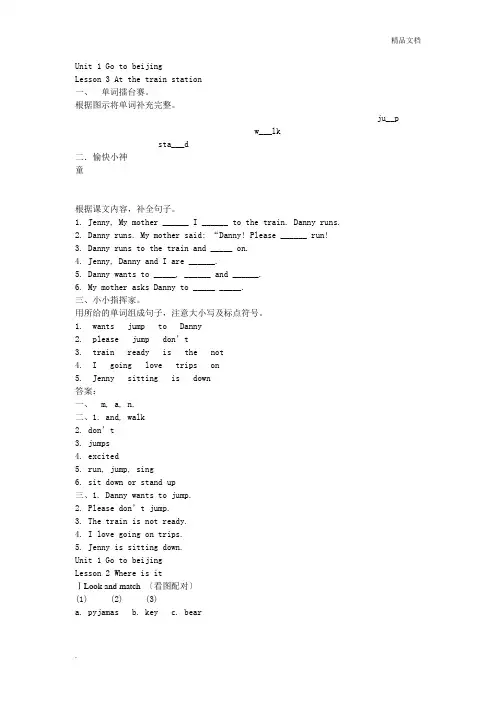
Unit 1 Go to beijingLesson 3 At the train station一、单词擂台赛。
根据图示将单词补充完整。
ju__pw___lksta___d二.愉快小神童根据课文内容,补全句子。
1. Jenny, My mother ______ I ______ to the train. Danny runs.2. Danny runs. My mother said: “Danny! Please ______ run!3. Danny runs to the train and _____ on.4. Jenny, Danny and I are ______.5. Danny wants to _____, ______ and ______.6. My mother asks Danny to _____ _____.三、小小指挥家。
用所给的单词组成句子,注意大小写及标点符号。
1. wants jump to Danny2. please jump don’t3. train ready is the not4. I going love trips on5. Jenny sitting is down答案:一、m, a, n.二、1. and, walk2. don’t3. jumps4. excited5. run, jump, sing6. sit down or stand up三、1. Danny wants to jump.2. Please don’t jump.3. The train is not ready.4. I love going on trips.5. Jenny is sitting down.Unit 1 Go to beijingLesson 2 Where is itⅠLook and match 〔看图配对〕(1) (2) (3)a. pyjamasb. keyc. bearⅡLook at the picture and match.〔根据图上的内容作出正确的选择〕a. Yes, I can.b. No, I can’t.(1) I Lost my key. Can you find my key?(2) I lost my pencil. Can you find my pencil?(3) I lost my shirt. Can you find my shirt?(4) I lost my ball. Can you find my ball?(5) I lost my book. Can you find my book?ⅢRead and write 〔补全所缺句子〕S1:Oh,no!My hat is lost.Where is it?(1)_____________________? 〔你能找到我的帽子吗?〕S2: Yes, here it is.I lost my key.(2)___________________? 〔你能找到我的钥匙吗?〕S1: Yes, here it is.S2: Thank you!答案:Ⅰ(1)c (2)a (3)bⅡ(1)a (2)b (3)a (4)a (5)bⅢ(1)Can you find my hat?(2)Can you find my key?Unit 1 Go to beijingLesson 3 At the train station一、单词擂台赛。

当代研究⽣英语读写教程下册练习及答案(全)\UNIT 11.During each of these passages, how we feel about our way of living will undergo subtle changes in four areas ofperception. One is the interior sense of self in relation to others.在这些变化和转折中,我们对⽣活⽅式的看法要经历四个感知⽅⾯的微妙变化:第⼀,在内⼼中对⾃⼰和他⼈的看法;1. A second is the proportion of safeness to danger we feel in our lives. A third is our perception of time—do we haveplenty of it,or are we beginning to feel that time is running out?第⼆,在⽣活的各种威胁⾯前所具有的安全感;第三是我们对时间的认识,是感到来⽇⽅长,还是开始感到时⽇⽆多?/doc/200593d969eae009581beca2.html st, there will be some shift at the gut level in our sense of aliveness or stagnation. These are the hazy sensationsthat compose the background tone of living and shape the decisions on which we take action.最后是对⾃⼰的精⼒和活⼒的直觉意识,是感到精⼒充沛,还是感到⼒不从⼼?这些都是在我们内⼼⾥产⽣的若明若暗的感觉,它们构成了我们⽣活的基调,影响着我们采取⾏动前的种种决定。
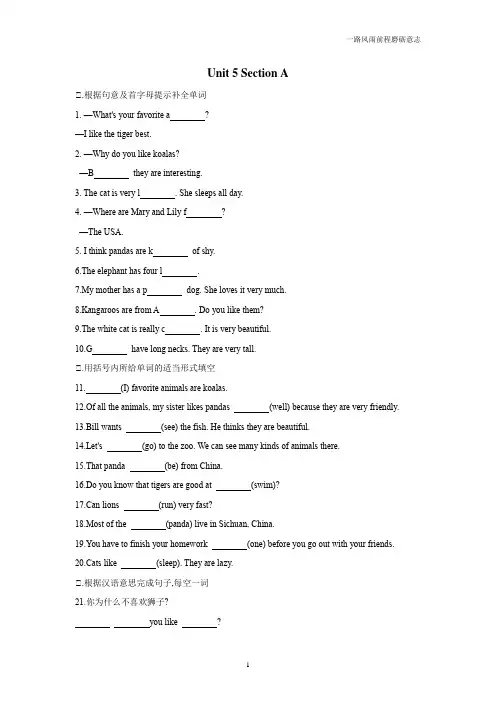
Unit 5 Section AⅠ.根据句意及首字母提示补全单词1. —What's your favorite a?—I like the tiger best.2. —Why do you like koalas?—B they are interesting.3. The cat is very l. She sleeps all day.4. —Where are Mary and Lily f?—The USA.5. I think pandas are k of shy.6.The elephant has four l.7.My mother has a p dog. She loves it very much.8.Kangaroos are from A. Do you like them?9.The white cat is really c. It is very beautiful.10.G have long necks. They are very tall.Ⅰ.用括号内所给单词的适当形式填空11.(I) favorite animals are koalas.12.Of all the animals, my sister likes pandas (well) because they are very friendly.13.Bill wants (see) the fish. He thinks they are beautiful.14.Let's (go) to the zoo. We can see many kinds of animals there.15.That panda (be) from China.16.Do you know that tigers are good at (swim)?17.Can lions (run) very fast?18.Most of the (panda) live in Sichuan, China.19.You have to finish your homework (one) before you go out with your friends.20.Cats like (sleep). They are lazy.Ⅰ.根据汉语意思完成句子,每空一词21.你为什么不喜欢狮子?you like ?22.我觉得老虎非常吓人。
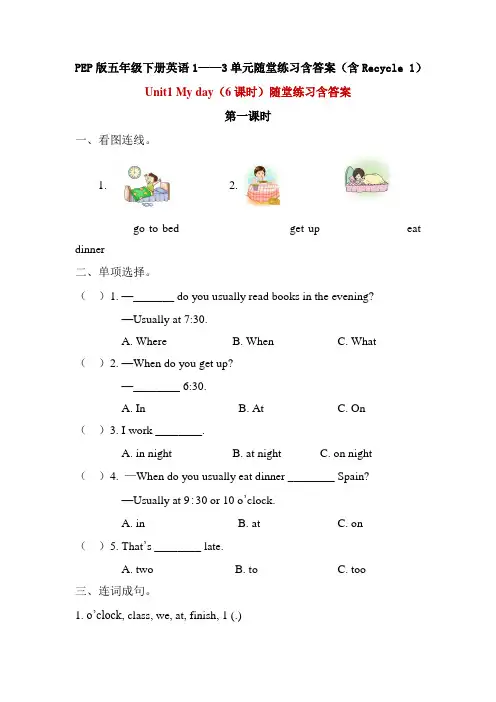
PEP版五年级下册英语1——3单元随堂练习含答案(含Recycle 1)Unit1 My day(6课时)随堂练习含答案第一课时一、看图连线。
1. 2. 3.go to bed get up eat dinner二、单项选择。
()1. —_______ do you usually read books in the evening?—Usually at 7:30.A. WhereB. WhenC. What()2. —When do you get up?—________ 6:30.A. InB. AtC. On()3. I work ________.A. in nightB. at nightC. on night()4. —When do you usually eat dinner ________ Spain?—Usually at 9:30 or 10 o’clock.A. inB. atC. on()5. That’s ________ late.A. twoB. toC. too三、连词成句。
1. o’clock, class, we, at, finish, 1 (.)_________________________________________ 2. usually, when, you, eat, do, dinner (?)_________________________________________ 3. 10 o’clock, at, 9:30, or, usually (.)_________________________________________ 4. lunch, after, go, when, to school, do, you, back (?)_________________________________________ 答案:一、1—get up 2—eat dinner 3—go to bed二、1. B 2. B 3. B 4. A 5. C三、1. We finish class at 1 o’clock.2. When do you usually eat dinner?3. Usually at 9:30 or 10 o’clock.4. When do you go back to school after lunch?第二课时一、选出正确的一项补全单词。

冀教版小学三年级英语下册练习题及答案(Lesson 5至Lesson 10)=========== Lesson 5 ==========一、听录音,判断对错,对的写“Yes”,错的写“No”。
1.thirteen2.eighty3. sixteen4. nineteen二、根据实际情况回答。
1. How many books do you have?2. How many erasers do you have?3. How many pencils do you have?4. How many markers do you have?三、读一读下面数字的英文表达,组合算式,说一说,?+?=sixty?ten twenty thirty forty fifty答案:一、1. thirty No2. eighty Yes3. sixteen Yes4. ninety No二、略。
三、1. ten + fifty =sixty / fifty + ten =sixty2. twenty + forty =sixty / forty + twenty=sixty3. thirty + thirty=sixtyI.Write the food you often eat for breakfast.(写出你经常吃的早餐)__________________________________________________________________II.Fill in the blanks.(补全单词)III.Match the pictures and the words.(连一连)IV.Fill in the blanks.(补全句子)1. I like eggs ______ breakfast.2. ______ you like juice?3.Jenny puts _____ and sugar on porridge.cereal4.The porridge is _____(美味的)。
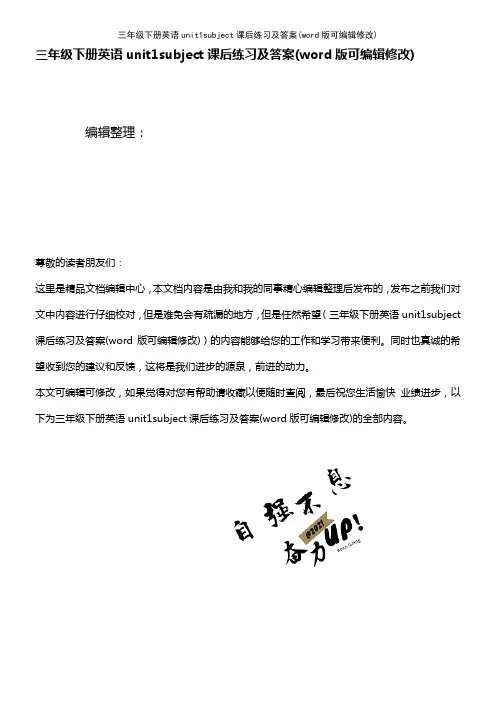
三年级下册英语unit1subject课后练习及答案(word版可编辑修改) 编辑整理:尊敬的读者朋友们:这里是精品文档编辑中心,本文档内容是由我和我的同事精心编辑整理后发布的,发布之前我们对文中内容进行仔细校对,但是难免会有疏漏的地方,但是任然希望(三年级下册英语unit1subject 课后练习及答案(word版可编辑修改))的内容能够给您的工作和学习带来便利。
同时也真诚的希望收到您的建议和反馈,这将是我们进步的源泉,前进的动力。
本文可编辑可修改,如果觉得对您有帮助请收藏以便随时查阅,最后祝您生活愉快业绩进步,以下为三年级下册英语unit1subject课后练习及答案(word版可编辑修改)的全部内容。
Unit 1 School Subjects课后练习一、单词语文英语科学体育音乐数学美术计算机课我们那个最喜欢的二、短语最喜欢的一天角色扮演听磁带和同伴讨论起床三、句子1.你周一上什么课?What on Monday?2.我们有英语和音乐课We have3.你喜欢计算机课吗?Do you ?4.我喜欢我的新学校I5.他们是我最喜欢的课They are my6.周二是我最喜欢的一天is my 7.起床!该上学了! It’s time8.我不想起床,学校太无聊了。
9.计算机课真有趣10.在周一的计算机课上,Tim写一封电子邮件11.他很开心12.在周三的音乐课上,Tim听美妙的音乐13.在周四的英语课上,Tim和他的同学们玩英语游戏四、写作练习要求:1、写一篇短文介绍你一周都上什么课,最喜欢上什么课.50词左右2、书写工整Dear LucyYours Tom答案一、单词Chinese English science PE music math art computer class we that favorite二、短语Favorite day role play listen to the tape discuss with partners三、句子1。
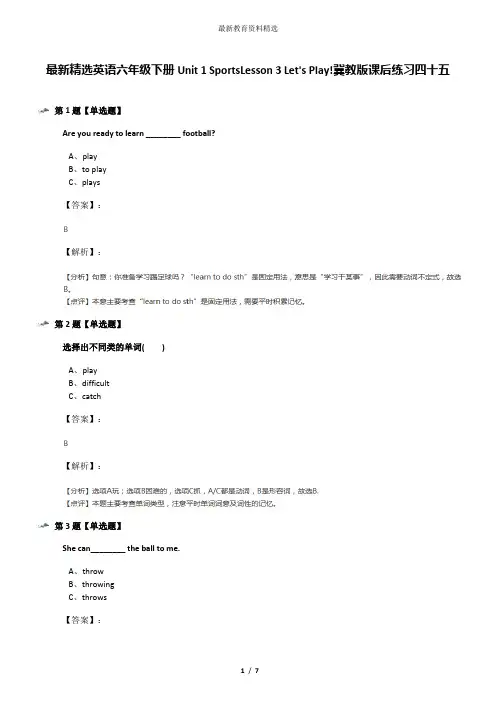
最新精选英语六年级下册Unit 1 SportsLesson 3 Let's Play!冀教版课后练习四十五第1题【单选题】Are you ready to learn ________ football?A、playB、to playC、plays【答案】:【解析】:第2题【单选题】选择出不同类的单词( )A、playB、difficultC、catch【答案】:【解析】:第3题【单选题】She can________ the ball to me.A、throwB、throwingC、throws【答案】:【解析】:第4题【单选题】选择出不同类的单词( )A、footballB、basketballC、easy【答案】:【解析】:第5题【单选题】I want ________ eat, ________.A、too; toB、to; tooC、too; too【答案】:【解析】:第6题【单选题】选择出不同类的单词( )A、readyB、learnC、teach【答案】:【解析】:第7题【单选题】选择出不同类的单词( )A、throwB、bigC、heavy【答案】:【解析】:第8题【填空题】She can ______ (catch) the ball.【答案】:【解析】:第9题【填空题】判断下列画线部分的发音是否相同,相同的标“T”,不同的标“F”。
1)______A. ready B. heavy2)______A. like B. hit3)______A. window B. throw4)______A. any B. easy5)______A. let B. me【答案】:【解析】:第10题【填空题】Danny ______ (buy) three balls. 【答案】:【解析】:第11题【翻译】英汉互译。
学习打篮球______throw the basketball______让我试一试______catch the basketball______太重了______too difficult______【答案】:【解析】:第12题【选词填空(词汇运用)】The basketball is heavy, but the ping\xadpong ball is ______.Can you teach me to play football? I want to ______.Math is easy, but Chinese is very ______.Li Ming can throw the basketball, but Danny can"t ______it.I don"t want these shoes. I want to buy ______shoes.【答案】:【解析】:第13题【补全对话】【答案】:【解析】:第14题【单词拼写(词汇运用)】拼写单词______ 【答案】:【解析】:第15题【单词拼写(词汇运用)】拼写单词______ 【答案】:【解析】:。
Unit 1Section A⼀、教师寄语:Confidence in yourself is the first step on the road to success.⾃信是⾛向成功的第⼀步。
⼆、学习⽬标:Knowledge goals(知识⽬标).Words : robot, paper, less, fewer, will, pollution, astronaut ,space, fly, aloneSentences:--- Will there be less pollution? --No, there won‘t. There will be more pollution.--Will there be fewer trees? --Yes, there will. Kids won‘t go to school.三、教学重难点◆重点由will构成的⼀般将来时态的句式。
◆难点 1.more,less,fewer的⽤法2.there be 句式的⼀般将来时态there will be四、学习过程1、预习导学及⾃测A.英汉互译1.污染________2.空闲时间_____________3.on computers___________4.study at home______5.in 100 years____________6. be free_________B.⽤more,less,fewer填空:1.There will be ________________(更多的建筑)in 50 years.2.The students will have _______________(更少的家庭作业)to do.3.There will be ________________(更少的污染)here.4. Kids will have ________________(更少的计算机)in their classroom.5.There will be ________________(更多的图书馆)in this city.6.There will be ________________(更少的树)in the park.2、语法⼩结:there be 结构①构成:肯定句:There be+某⼈/某物+地点/否定句:There be +not, some改any,(not any可以换成no)/ ⼀般疑问句;be提前,some改any② there be 接词要运⽤就近原则.a. There____ a book and two rulers on the desk.b. There ____ two rulers and a book on the desk.③ There be 句型有时态的变化a. ⼀般现在时:There is/are…b. ⼀般过去时:There was/were…c. ⼀般将来时:There will be… / There is/are going to be…④ there be句型的⼀般将来时结构为:There will be + 主语+其他。
(完整版)小学五年级下册英语练习题及答案人教版---------------------------------------------------------------最新资料推荐------------------------------------------------------ 小学五年级下册英语练习题及答案人教版小学五年级下册英语练习题及答案人教版听力部分一、听录音,根据听到的内容,选择相应的图片,将序号填在括号里。
二、听录音,将你所听到句子的序号写在题前括号里。
1. A. There are seven days in a week. B. There are four seasons in a year.2. A. Whats the weather like in spring?B.Why do you like spring? 3. A. I like fall best. B. I like summer best. 4. A. I wear my T-shirt in summer. B. I wearmy dress in summer. 三、听录音,判断句子与你所听到的是否相符,相符的打,不符的打。
1. I like spring best. Its windy and warm.2. Icant plant trees in spring. 3. Zooms favourite season is summer. 4. I like winter best. Because its too cold.5. I can swim in summer. 四、听录音,根据听到的内容,补全对话。
A: Whats your_____________ season? B:_____________. A: Why do you like_____________? B:_____________I can go hiking. Which season do you like_____________? A:_____________. B: Why do you like_____________? A:_____________I can skate. 笔试部分一、选择与所给单词画线部分发音相同的词,将序号写在题前括号里。
⼈教版七年级下册英语同步练习册答案参考 为明天做准备的最好⽅法就是集中你所有智慧,所有的热忱,把今天的七年级英语同步练习册做得尽善尽美,这就是你能应付未来的唯⼀⽅法。
下⾯是⼩编为⼤家精⼼整理的⼈教版七年级下册英语同步练习册答案参考,仅供参考。
⼈教版七年级下册英语同步练习册答案参考(⼀) Unit 5 Section A I. 1. do homework 2. watch TV 3. eat have dinner 4. talk on the phone 5. go to the movies 6. write a letter 7. wait for 8. talk to/with 9. read books 10. are; doing; watching 11. doing; is doing homework 12. doing; is reading 13. to go to the movies; Certainly; boring; When; Let’s go 14. waiting for 15. reading 16. talking to 17. talking about 18. going II.1-5 CACBC III. 1-5 DBAEC Section B I. 1. thanks for 2. in the first photo 3. play basketball 4. at the swimming pool 5. in the last photo 6. be with 7. photo of my family 8. play soccer 9. Thanks for 10. some of my photos 11. first; playing basketball 12. swimming 13. are eating dinner 14. last; with;doing homework;watching TV 15. swimming; I’m not II.1-5 BBACB III.1-5 ACBAB Self Check 1 I. 1-5 CCAAC II. 1-5 CBCAA 6-10 CBBCA III. 1. There are some students in the classroom. 2. Two boys are cleaning the windows. 3. Wang Fang and Han Mei are talking. 4. Li Lei is reading a book. 5. Jenny is drawing a picture. Self Check 2 I. 1. —What are you doing? —I’m reading books. 2. —Are they swimming? —No, they are playing basketball. 3.We are eating/having dinner. 4. —Is he watching TV? —No, he is doing (his) homework. 5. —What are you doing? —We are playing football. 6. I’m not sleeping. I’m watching TV. 7. Do you want to go to the library with me? 8. The TV show is very boring. 9.When do you want to swim? 10. Here is a photo of his family. II. 1-5 AABBC 6-10 ACCBA III. 1-5 BACBA ⼈教版七年级下册英语同步练习册答案参考(⼆) Unit 7 Section A I.1. curly 2. nothing 3. brown / blonde 4. pop 5. nobody II. 1-5 BBACC III. 1. look like 2. short hair 3. long hair 4. curly hair 5. straight hair 6. medium height 7. medium build 8. short straight hair 9. very popular 10. a little bit quiet 11. does; look like; of medium build; has 12. know; don’t think I know 13. always wears 14. captain 15. popular 16. good-looking; a little bit quiet 17. to tell jokes 18. a little bit heavy 19. never stops talking 20. reading; playing chess IV. 1-5 BEDCA Section B I. 1. build 2. captain 3. Remember 4. always 5. joke II. 1-5 ACBAA III. 1. a tall man with glasses 2. Some people; new looks 3. I don’t think he’s so great; does 4. go shopping; nobody knows me 5. tell jokes 6. love 7. long black hair 8. stop 9. like 10. pop singer 11. with glasses 12. a new look Self Check 1 I.1. with a beard; curly hair 2. her new look 3. looks like 4. stops working 5. popular;of II. 1. doesn’t do 2. Does; have 3. Who does; look 4. medium height 5. in III. 1-5 BCBCA 6-10 BACBA IV. 1. round 2. light brown and short 3. thin 4. long curly 5. big blue Self Check 2 I. 1. know 2. look 3. medium 4. bit 5. curly 6. glasses 7. good-looking 8. jokes 9. popular 10. remember II. A) 1-5 CBCAB B)1. Susan. 2. Because she has an important meeting. 3. William. 4. Tall. 5. Yes, she does. ⼈教版七年级下册英语同步练习册答案参考(三) Unit 9 Section A I. 1. were; was 2. meet; met 3. having 4. called; was; said 5. did; played II. 1-5 CCBAA III. 1. on Saturday morning 2. last weekend 3. do; homework 4. do some reading 5. beautiful beach 6. clean one’s room 7. the library 8. the movies 9. the pool 10. play tennis 11. play volleyball 12. play the guitar 13. study for 14. practice English 15. great; OK; wasn’t 16. did; do; stayed; studied for the math test; What about; visited 17. On Saturday evening Section B I.A) 1. week 2. practise 3. spend 4. test 5. middle B) 6. cleaned 7. had 8. wanted 9. was 10. visited II. 1-5 BAABC III. 1. practise one’s guitar 2. stay at home 3. study for the test 4. in the afternoon 5. study geography 6. a little difficult 7. play sports 8. clean the room 9. go shopping 10. have a busy weekend/day 11. play chess 12. play computer games 13. play soccer with 14. visit friends 15. watch a movie 16. watch TV 17. read a book about history 18. For most kids 19. went shopping 20. had a busy weekend Self Check 1 st month 2. sad 3. go for a walk 4. play with 5. sit down 6. look for 7. watch; do 8. enjoys their weekends II. 1. She was at school two hours ago. 2. He wasn’t a great singer in 1999. 3. He (often) went to the mountains with his friends last month. 4. I wrote a letter to my brother yesterday evening. 5. He had a glass of milk this morning. III. 1-5 BCACB Self Check 2 Ⅰ. 1. what about 2. to have 3. stayed at 4. talk show 5. How; spend Ⅱ. 1-5 CDAEB Ⅲ. 1-5 CBACB 6-10 CAABB。
冀教版四年级英语下册全册课时练习Lesson1How Are You?一、小动物们迷路了,赶快帮它们找到家吧。
二、把气球里的字母重组成单词。
三、选出每组单词中不同类的一项。
)1.A.teacher B.friend C.pupil D.you()2.A.she B.my C. he D.you ()3.A.his B.your C. my D.you ()4.A.new B.fine C.good D.pupil ()5.A.school B.welcome C.call D.meet 四、我会选。
()1.Hello,_______name is Jack.A.IB.myC.me()2.You can call________Mr.Wang.A.meB.IC.my()3.Nice to_______you.A.meatB.meetC.me()4.These are my________.A.friendsB.friendC.a friend()5.________name is Jack._______is my friend.A.He;HisB.His;HeC.Her;He()6.—What s name?—Her name is Jenny.A.yourB.herC.his五、交际小能手。
(根据情景选择正确的答案)()1.两人见面后,要问好,应该说:A.How do you feel?B.How are you?C.How old are you?()2,要表达,我是你的新老师。
”,应该说:A.r m your new teacher.B.F m a new pupil.C.He is a new teacher.()3.新学期开学时,老师对学生们说:A.Welcome back to school.B.How old are you?C.Very well,thank you.()4.李明向詹妮介绍他的朋友Kim,应该说:A.Li Ming,this is Kim.B.Jenny,this is Kim.C.Li Ming is my friend.()5.你想知道对方的名字时,应该说:A.What's your name?B.How are you?C.Fine,thanks.六、选择合适的句子,补全对话。
最新⼈教版五年级英语下册配套练习册答案(全册)五年级英语下册配套练习册参考答案本⽂档适合的配套图书⽬录封⾯ (1)Unit 1 My day参考答案..........................................第2~3页Unit 2 My favourite season 参考答案........................第4~5页Unit 3 My school calendar 参考答案........................第6~7页Recycle 1参考答案 (8)Unit 4 When is Easter?参考答案........................第9~11页Unit 5 Whose dog is it?参考答案........................第12~14页Unit 6 Work quietly! 参考答案........................第15~17页Recycle 2参考答案 (18)Unit 1 My dayPart AⅠ. Read and number.(读⼀读,给句⼦排序。
)3, 1, 2, 4, 5Ⅱ.Write and say.(填写⾃⼰的作息时间表,并与同伴说⼀说。
)略。
Ⅲ. Choose the best answers.(单项选择。
)1. C2. B3. A4. BⅣ.Look, read and choose.(看图,为图⽚选择恰当的描述语。
)1. B2. D3. A4. F5. E6. CⅤ.Read and circle. (读⼀读,圈出恰当的词语。
)Today is Monday. I ( eat / has /do ) breakfast at home at 7:00. I ( go / have / has ) English class at 9:00 in the morning. After class, I ( playing/ play / plays ) with my friends. I ( go /comes / goes ) home at 5:00 in the afternoon. I usually ( eats / have / drink ) dinner at seven in the evening.Ⅵ.Read and judge.(阅读短⽂,根据短⽂内容判断句⼦正“T”误“F”。
⼈教版PEP⼩学英语五年级下册课堂同步练习附答案(全册)五年级(下)第⼀单元第1课时学案Unit 1 My dayPart A Let’s talk【学习⽬标】1.能够听懂、会说句型:When do you finish class in the morning? We finish class at 1o’clock.并能在实际情景中运⽤。
能够正确使⽤usually这个频度副词。
2.能在Role play部分⽤本课时⽬标语⾔询问同学的作息时间,并能对结果做简单的反思。
【重点难点】重点:能够熟练使⽤句型:―When do you finish class in the morning? We finish class at 1o’clock.问答活动时间。
难点:能够在情境中熟练使⽤句型:―When do you …?问答活动时间。
【新知预习】写出下列单词或词组的意思。
1. finish class ______________2. after lunch_________3. start _____________4. Spain__________5. too late_____________【课堂探究】探究1 根据汉意写单词。
1. 吃午餐__________________2. 回学校_____________3. 吃晚餐________________4.什么时候_____________5. 或者________________探究2 翻译下列句⼦。
When do you finish class in the morning? ___________________________________Classes start at 3 o’clock. __________________________________【针对练习】单项选择。
1.---________ do you go to bed?--- At 9:00.A.WhatB. whenC. When2.I eat dinner _____ 6 o’clock.A. aB. atC. on【达标练习】Ⅰ. 选择正确答案。
第一部分 Text A & 第二部分 Text B第一部分 Text A【课文译文】决策是什么?决策是从可供挑选的行动方案中作出选择,目的在于确定并实现组织机构的目标或目的。
之所以要决策是因为存在问题,或是目标或目的不对,或某种东西妨碍目标或目的实现。
因此,决策过程对于管理人员非常重要。
管理者所做的一切几乎都与决策有关,事实上,有人甚至认为管理过程就是决策过程。
虽然决策者不能预测未来,但他们的许多决策要求他们必须考虑未来可能会发生的情况。
管理者必须对未来的事情作出最佳的猜测,并使偶然性尽可能少地发生。
但因为总是存在着未知情况,所以决策往往伴随着风险。
有时失误的决策带来的后果不很严重,但有时就会不堪设想。
选择就是从多种选项中进行取舍,没有选择,就没有决策。
决策本身就是一个选择的过程,许多决策有着很广的选择范围。
例如,学生为了实现自己获得学位的目标,可能会从多门课程中进行选择,对于管理者来说,每一个决策都受到政策、程序、法律、惯例等方面的制约,这些制约存在于一个组织的各个部门里。
选项就是可供选择的种种可行的行动方案。
没有选项,就没有选择,因而也就没有决策。
如果看不到任何选项,这意味着还没有对问题进行彻底的研究。
例如,管理者有时会用“非此即彼”的方式处理问题,这是他们简化问题的方法。
这种简化问题的习惯常常使他们看不到其他的选项。
在管理这个层次上,制定决策包括:识别选项和缩小选项范围,其范围小到微乎其微,大到近乎无限。
决策者必须有某种方法来断定几种选项中的最佳选项,即哪个选项最有利于实现其组织的目标。
组织的目标是指该组织努力完成或达到的目标或现状。
由于个人(或组织)对于怎样实现其目标的方式都有不同的见解,最佳的选择就在于决策者了。
常常是一个组织的下属部门做出的决策对自己有利,而对上一级的部门来说,就不是较佳选择了。
这种增加部门的局部利益而减少其他部门的局部利益所作出的权衡,叫做局部优化。
例如,市场营销经理为增加广告预算可能会讲得头头是道,但从更大的布局来看,增加优化产品的研究经费也许对组织更有利。
这种权衡的存在是因为组织想要同时达到的目标很多,其中有些比另一些重要,但其重要性与排序是因人和部门而异的。
不同的管理者会对同一问题持不同的看法。
面对同样一种情况时,销售经理倾向于销售方面的问题,而生产经理则着眼于生产方面的问题,如此等等。
多种目标的重要性与排序还部分地取决于决策者的价值观,这些价值观具有个人色彩,令人难以捉摸,甚至其本人也很难讲清楚,因为价值观是动态和复杂的,在很多业务场合,对于风险与收益可接受的程度往往会使不同价值观的人对其决策的正确性产生不同意见。
人们常常认为,决策是一个孤立的现象。
但从系统的观点看,问题的产生有多种原因,而且决策有预期的和意料之外的结果。
一个组织是一个发展中的实体,今天做出的决策可能会在很远的将来才会有结果。
因此,老练的管理人员要放眼于当前决策在将来可能会产生的后果。
【课文难点注释】1.A decision is a choice made from among alternative courses of action…“among alternative courses of action”是介词短语作介词“from”的宾语,能够这样用的介词有:from,except,until,by,in等。
[例句]That machine was done by between forty and fifty workers. 这台机器是由人数在40~50之间的工人制作的。
He goes nowhere except to the church on Sundays. 星期天他除了去教堂外不去任何地方。
2.…and try to leave as little as possible to chance.这是由leave…to…和as…as possible两个短语组成的句子,前者意为“把…留给…”,后者意为“尽可能地”[例句]They had to leave as little as possible to chance. 他们得尽可能少地使偶然性发生。
We should leave as little as possible to incorrect decisions. 我们应该尽可能少地做出错误决策。
3.Alternatives are the possible courses of action from which choices can be made.which 是关系代词,指代the possible courses of action,作介词from的宾语,关系代词指代物体作介词宾语时必须是关系代词which,代词前的介词一般是由从句中的谓语动词来决定的,或所修饰的词来决定的。
[例句]The computer is a subject about which many books are written.计算机是许多书所写的一个课题。
The door of which you lost the key cannot be opened.你丢钥匙的那扇门开不了。
4.These trade offs occur because…,occur是不及物动词,意为“发生,产生,存在,意识到”等,通常是事物作其主语,它既可指难以预料的事发生,也可指预料中的事发生,如某人想起了什么或发生了什么则用介词“to”。
[例句]Don’t let the mistake occur again.不要让这种错误再次发生。
An idea occurred to him. 他想到了一个主意。
5.When presented with a common!case,sales managers…这是由when引起的省略句,省略部分为“they are”。
能够引起这样省略句的词有:when,if,as if等等。
[例句]When something wrong with his car,he would always go to his autorepair man.当他的车出毛病时,他总是去找他的汽车修理师。
这里省略的词为“there was”。
He will give us a hand when necessary. 必要时他会帮助我们的。
这里省略的词为“it is”。
【课文练习答案】Ⅰ. 1-d 2-c 3-c 4-a 5-dⅡ.1.alternative 2.fundamental 3.accompany 4.implement 5.precedent6.attain7.objectives8.vary9.multiple 10.isolateⅢ.1-c make decisions 2-d design programs 3-i solve problems4-j survive accidents 5-g seize opportunities 6-e pursue studies7-h attain goals 8-a earn money 9-f consume time 10-h pay debts Ⅳ.One evening while my wife and I were entertaining our dinner guests,our five-year-old daughter Debbie helped her mother serve dessert.Debbie brought the first slice of pie from the kitchen and placed the plate in front of me.I politely passed it to the woman next to me.Debbie put another slice of pie before me and again watched as I passed it to another guest.“You might as well keep it,”my daughter said,“They are all the same size.”Ⅴ.1.Decision makers should be able to make a best guess at what the future will be.2.Some people suggest that all a manager does involves decisions.3.If there is no right choice there is no right decision to be made.4.Solutions vary because different people define the same problem in different terms.5.Decision makers are usually the key to the business development of a company.【词汇练习答案】Ⅰ. 1.a.be organized anizational anization2.a.simple b.simplified c.simply d.simplification3.a.profit b.profitable c.profitability4.a.intention b.intended c.unintendedⅡ. 1.prece dent 2.skilled 3.achievement 4.implement 5.optimal6.goal7.accomplish8. accompanies9.tendency 10.ongoingⅢ.1.He was accompanied to the concert by his friend.2.He has argued her out of her decision.3.His success was due in part to luck.4.In accordance with his suggestion,the procedure has been greatly simplified.5.The broadcast station predicted that it would be cold tomorrow.6.Movement is defined as a change in position or place.第二部分 Text B【课文译文】面试成功的秘诀我们今天的话题是面试。